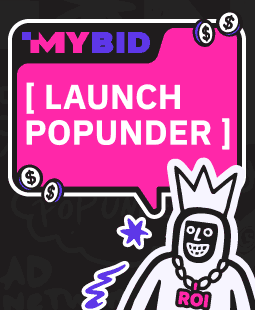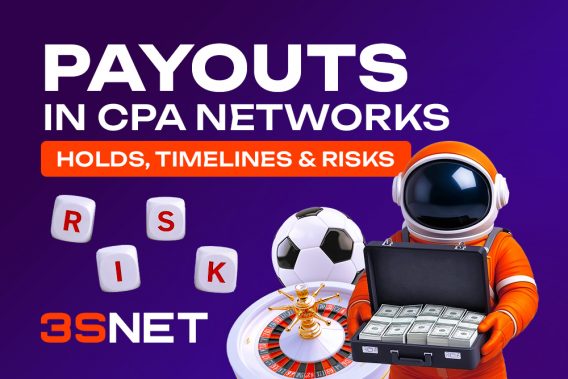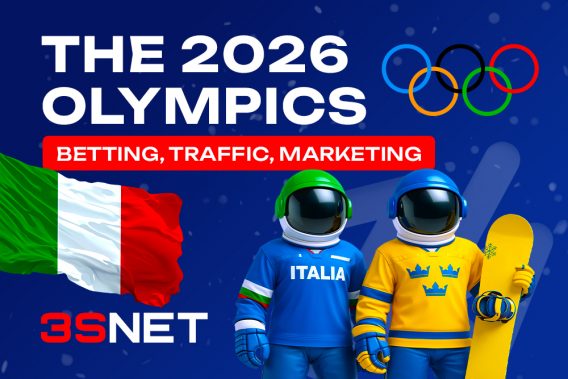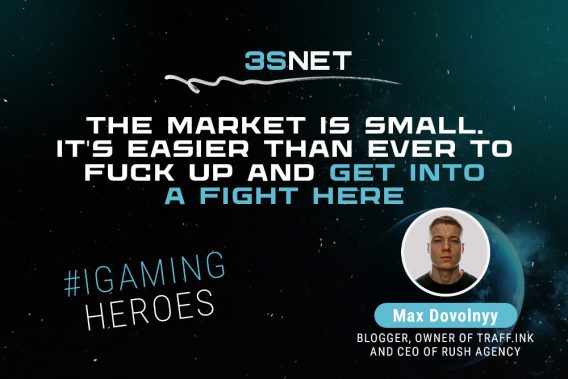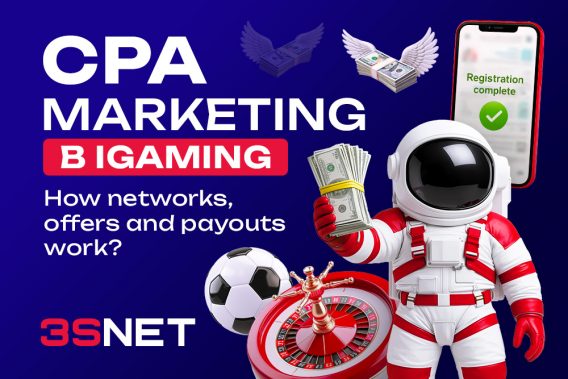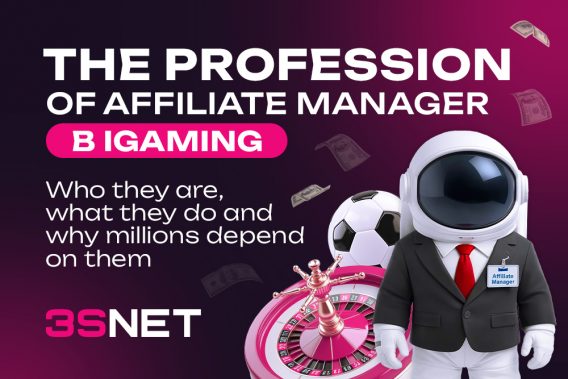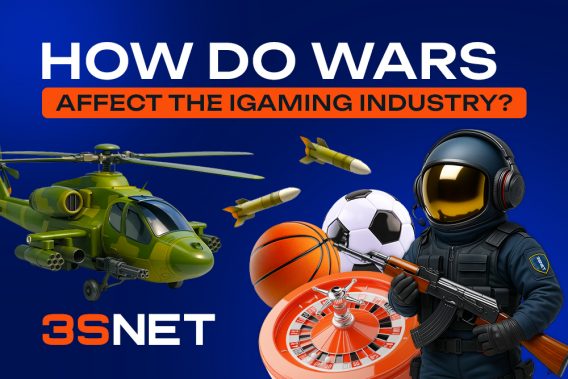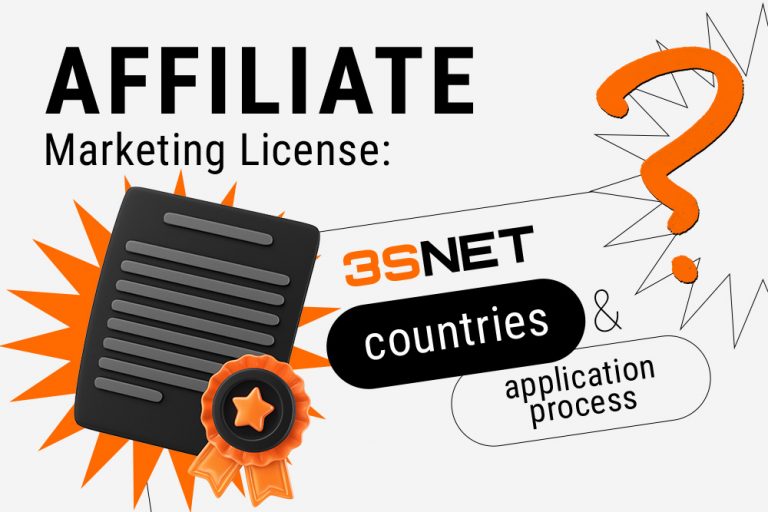
Publication date: 26 June 2025
Gambling is regulated in many countries worldwide. It may be banned entirely, permitted fully, or partially allowed, such as for online casinos and betting companies only. In any case, the authorities closely monitor all activities related to the promotion of gambling and betting. Specialists working in this field must pay close attention to legislative nuances. In some countries, an affiliate manager license may be required to perform these tasks. In a new article on 3S.INFO, we’ll examine which countries require a license for media buyers, how to obtain one, and the consequences of ignoring this requirement.
What license is required for an affiliate marketer?
Such a license is typically an official document issued by the regulatory agency in each country and includes information confirming the affiliate’s right to conduct advertising activities in accordance with the region’s laws. Examples of license terms can be viewed on the UK Gambling Commission website. While the format of the permit may vary, it generally includes the following points, which are common to most standard documents:
- Name of Issuing Authority: An affiliate can obtain a license from the same regulatory body that grants operators permission to conduct gambling businesses. Examples include the Romanian National Gambling Office (ONJN) and the Maltese Gaming Authority (MGA). Further details about these countries will be outlined later in the article.
- License Number: Every document has a unique identification number that is used to verify and validate the affiliate’s legitimacy.
- Issue Date and Validity Period: This specifies the date when the license was issued and its validity period. Some licenses require renewal after a specified period of time.
- Type of Activity: Clearly defines the type of activity the affiliate is authorized to conduct and specifies the scope of advertising they can use in their campaigns.
- Conditions and Restrictions: Includes the rules and requirements that affiliates must follow in their advertisements. This section may contain clauses regarding user data protection and other legal limitations. The criteria in this section may vary significantly across countries depending on the region’s overall gambling regulations.
- Information about Legal Entity: For advertising agencies or large media buying teams, the license may include company details such as the name, address, and registration number. For solo affiliates, the license holder’s personal information may also be included.
- Signature and Authentication: As with any official document, the license will bear the signature of a regulatory authority representative and may include an official seal or stamp to verify its authenticity. Some licenses include a QR code or a link to an online resource where the license’s status can be verified.
How does an affiliate get a license?
- Study the country’s local legislation and compile the necessary documentation for submission.
- Submit an application to the regulatory authority that specifies the type of activity and area of specialization in detail.
- Await the inspection results. The regulatory authority will audit all submitted data for accuracy and compliance with regulations.
- Make the payment. Some licensing authorities require fees for issuing or renewing a license. The amount depends on the region and the scope of services included in the affiliate’s application.
- Receive the license. After a successful inspection and fulfillment of all requirements, a license will be issued, confirming the right to advertise gambling services.
In some countries, the operator working with the affiliate may independently file the license application, taking on all financial and legal responsibilities.
Why does an affiliate need a license?
- Tax compliance: It allows for the proper taxation of earned profits according to local tax laws and simplifies the transfer of funds to service provider accounts.
- Data protection: It ensures compliance with user data protection regulations, fair advertising practices, and transparent financial transactions.
- Regional Legal Framework: Licensing guarantees adherence to regional laws and regulations.
- Preventing fraud: It helps prevent fraudulent activities, which is crucial in gambling and betting, where manipulation risks are high.
- Credibility: Having a license confirms that the media buyer operates within established norms, thereby enhancing trust and reliability for both users and operators.
Operating without a license can result in penalties for the affiliate and their operators, erode user and business trust, and waste budgets..
In which countries is it mandatory for an affiliate manager to obtain a license?
Let’s look at examples of countries where a license is required for advertising activities in the gambling and betting sectors.
What license is needed for promoting gambling in Romania?
Romania has relatively strict gambling regulations. Affiliates who promote online casinos, bookmakers, or other gambling services must comply with local laws.
In order to obtain a license, an affiliate must register with the Romanian National Gambling Office (ONJN — Oficiul Național pentru Jocuri de Noroc). The ONJN is a government agency that regulates all forms of gambling, including online casinos and sports betting. The ONJN website does not provide a direct link for submitting an affiliate application. Therefore, the application process can only be initiated by sending an email or visiting the office in person.
Both options require the following documents: company information; advertising plans, including the services to be promoted; financial statements; AML and GDPR procedures; and more. ONJN generally evaluates submitted documents and renders a decision within one to two months, depending on workload and complexity. However, this timeline may be extended if additional checks are needed. After a positive decision is made, it can take several weeks to receive the actual license.
In addition to individual affiliates (individuals) marketing agencies and advertising networks that handle the placement of promotional materials aimed at attracting users can also apply for a license.
How to obtain an affiliate manager license in the UK?
In this region, licenses can be obtained from the UK Gambling Commission. This applies to gambling operators and affiliates who promote these services. Information about the application process, rules, and audit criteria can be found here.
В Великобритании для получения лицензии на продвижение азартных игр, аффилейту In order to obtain a license to promote gambling services in the UK, an affiliate must submit documents that demonstrate compliance with regional legal requirements and safety standards. The standard package of documents required for an affiliate license in the UK includes:
- Financial statements and extracts from several years demonstrate operational stability, tax payments, sources of income, and financial solvency.
- Evidence that advertising activities comply with regional laws, are not related to money laundering (e.g., passing KYC procedures), and include security measures to protect user data (GDPR compliance).
- Information about the companies with which the affiliate intends to cooperate and verification of their licenses (which may require a cooperation agreement).
- Data on security systems and website protection against hacking and fraud, such as encryption details and backup systems.
- A detailed description of the affiliate’s activities, products, and services, as well as information on how they will be advertised and promoted, including traffic sources, targeting settings, and niche.
How to Direct Traffic to Betting and Gambling with a Maltese License?
Malta’s gaming sector is dynamic and growing. It is regulated under the provisions of the Gambling Act (Chapter 583 of the Laws of Malta). Affiliates can obtain the necessary license through the Malta Gaming Authority (MGA).
All active and suspended licenses are publicly accessible online on the authority’s website. Common reasons an affiliate may lose their license include breaching advertising rules (e.g., targeting minors, misleading or deceiving users, or using aggressive advertising), failing to protect user data, not complying with AML/KYC requirements, not paying license fees or taxes, and breaching license terms.
If a license has been revoked for the aforementioned reasons, the affiliate may correct the errors and submit a new application or request a review, which will require them to undergo the licensing procedure again. The timeline depends on several factors, including the reason for revocation, the severity of the violations, and how promptly the affiliate addresses the deficiencies and meets the authority’s requirements. Overall, the process can take anywhere from several weeks to several months.
What are the key features of an affiliate license in Gibraltar?
Similar to Malta, Gibraltar is one of the most renowned jurisdictions for gambling industry affiliates. Licensing is handled by the HM Government of Gibraltar. According to its official website, in order to obtain a license, an affiliate must guarantee that all gambling-related advertising, conducted through any medium (including online), will be truthful and accurate. Advertising must explicitly target adult players. Licensees must also ensure that their websites and advertising links do not reference violent or immoral content. Licenses are granted on the condition that the advertising and promotion of gambling services are directed only at citizens of countries where such activities are legal and that the licensee will not provide gambling services if doing so would violate applicable laws.
Spanish License for Promoting Gambling Services
According to Section 17.1, paragraph 2 of Royal Decree 1614/2011 of November 14, media buyers working with online casinos or other gambling services in Spain must register with the relevant authorities, such as the Spanish National Commission for Gambling Regulation (Dirección General de Ordenación del Juego). This decree enforces Law 13/2011, passed on May 27, which regulates gambling licenses.
- The full text of the law is available on the agency’s official website.
- The application format and required documents for obtaining a permit can be found in the “Procedures and Services” section online.
US license for affiliate marketing
Gambling regulations vary significantly by state in the United States. Some states require affiliates to obtain a license to promote gambling (e.g., New Jersey, Michigan, Illinois, Colorado, and Arizona), while others prohibit such advertising even if gambling is legal (e.g., West Virginia, Arkansas, Illinois, Nevada, Oklahoma, and Washington). Therefore, affiliate licensing depends on the state and is determined by the jurisdiction where the activity takes place and the types of gambling being advertised.
- New Jersey: The first state to legalize online casinos and sports betting. Media buyers must register and obtain authorization from the Division of Gaming Enforcement (DGE). The primary laws and licensing procedures can be found on the official website.
- Nevada: Gambling is tightly regulated. Affiliates working with online gambling must obtain a license from the Nevada Gaming Control Board.
- Pennsylvania: This state has also legalized gambling. Affiliates promoting gambling must register with the Pennsylvania Gaming Control Board (PGCB) and receive approval.
- Michigan (Michigan Gaming Control Board, MGCB) and Rhode Island (Rhode Island Lottery): Affiliates must obtain a license and can only be certified by licensed gambling operators within the state.
Peculiarities of obtaining an affiliate license in Greece
The Hellenic Gaming Commission (HGC) regulates affiliate licensing for gambling activities in Greece. Operators in this region are only allowed to work with licensed affiliates. Key requirements for obtaining a license include targeting advertising exclusively to adult players and complying with legal restrictions. Affiliates must collaborate only with companies that adhere to consumer protection rules, responsible gaming principles, and fraud prevention measures. All criteria for obtaining a certificate are outlined on the regulator’s official website.
Although a license is not always mandatory, obtaining the necessary documentation protects against legal risks if an affiliate manager works officially, handles large sums of money, or operates in regulated sectors such as finance, gambling, or medicine.
In most countries, violating affiliate rules can result in license revocation. Information about canceled licenses is entered into an online registry. Affiliates and operators may also be fined. These consequences pose reputational risks and budget losses. Depending on the severity of the violation, the situation may escalate to administrative or even criminal punishment, as prescribed by the laws of the respective country.
Share it with your friends via favorite social media

